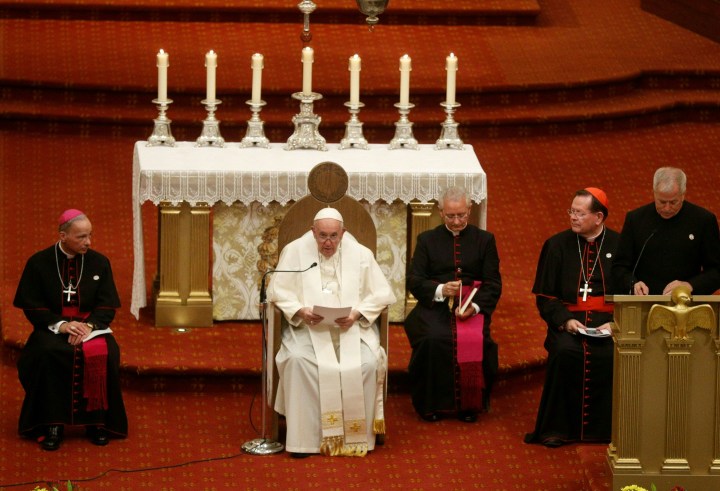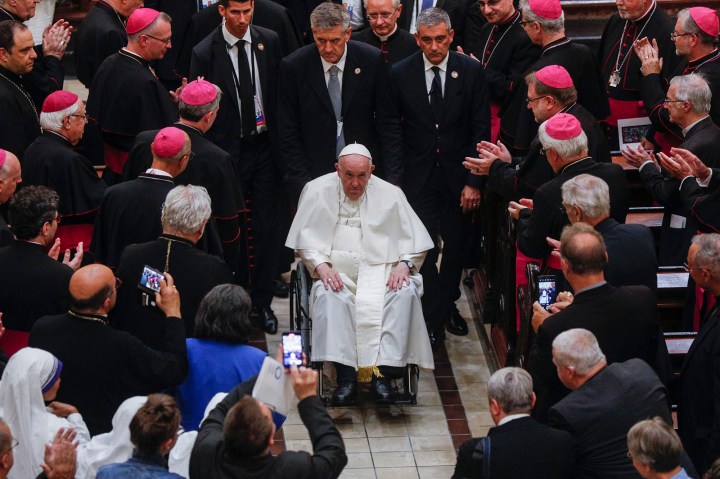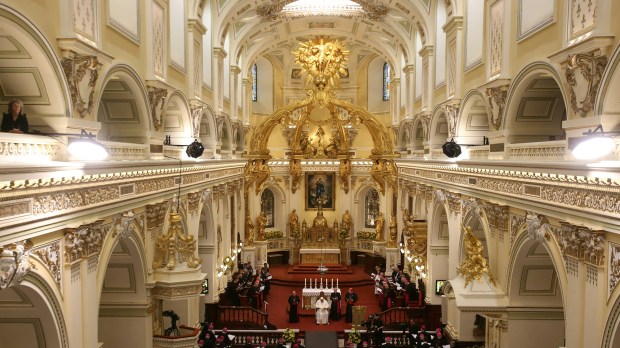Pope Francis pointed a way forward for Canadian Catholics in the face of the secularism that surrounds them as he met with Canadian bishops, priests, and consecrated persons at the Basilica of Notre Dame in Quebec City on July 28, 2022.
As well, during the meeting on the fifth day of his apostolic journey, the pope asked for forgiveness from victims of sexual abuse within the Church, exclaiming, “Never again!”
From this primatial seat of Canada, where the country’s first bishop, St. Francis de Laval (1623-1708), settled, the pope gave his advice to the Church’s pastors in the face of the very prevalent secularism in Canadian society, where God is “almost in the background” and where “new forms of atheism” that are “subtle and diverse” are emerging.
“Let us not allow the spirit of secularism to enter our midst, thinking that we can create plans that work automatically, and by human effort alone, apart from God. It is idolatry to create plans without God,” the head of the Catholic Church recommended to the hundreds of clergy, religious and pastoral agents of the Catholic Church in Canada present.
The pope spelled out two possible views of the world in which we live: “I would call one ‘the negative view,’ and the other ‘the discerning view,’ using a distinction proposed by St. Paul VI between secularization and secularism.
The first, the negative view, is often born of a faith that feels under attack and thinks of it as a kind of “armor,” defending us against the world. This view bitterly complains that “the world is evil; sin reigns,” and thus risks clothing itself in a “crusading spirit.” We need to be careful, because this is not Christian; it is not, in fact, the way of God, who – as the Gospel reminds us – “so loved the world that he gave his only Son, that whoever believes in him should not perish but have eternal life” (Jn 3:16). The Lord detests worldliness and has a positive view of the world. He blesses our life, speaks well of us and our situation, and makes himself incarnate in historical situations, not to condemn, but to give growth to the seed of the Kingdom in those places where darkness seems to triumph.

Thus, secularization is not a question of “loss of material wealth and privileges” but “a challenge for our pastoral imagination,” said the pontiff, who insisted that the proclamation of the Gospel is “not primarily a matter of words, but of a witness abounding with gratuitous love.”
The pope also emphasized the freedom of the believer: God “does not want to make decisions for us, or oppress us with a sacral power, exercised in a world governed by religious laws. No! He created us to be free, and he asks us to be mature and responsible persons in life and in society.”
Request for forgiveness for sexual abuse
The 85-year-old pope, who came to Canada on a journey of repentance for the abuses suffered by Indigenous peoples in residential schools run by religious, also spoke of the Church’s journey in Canada, “hurt and devastated by the evil perpetrated by some of its sons and daughters.”
He mentioned in particular the “sexual abuse of minors and vulnerable people, scandals that require firm action and an irreversible commitment.”
I would like once more to ask forgiveness of all the victims. The pain and the shame we feel must become an occasion for conversion: never again!

On the subject of reconciliation with Indigenous people, he hopes that “never again can the Christian community allow itself to be infected by the idea that one culture is superior to others, or that it is legitimate to employ ways of coercing others.” His speech received a standing ovation in the cathedral.
After a time of silent prayer before the tomb of St. Francis de Laval, the pope returned to the front of the cathedral so he could greet the bishops personally.

